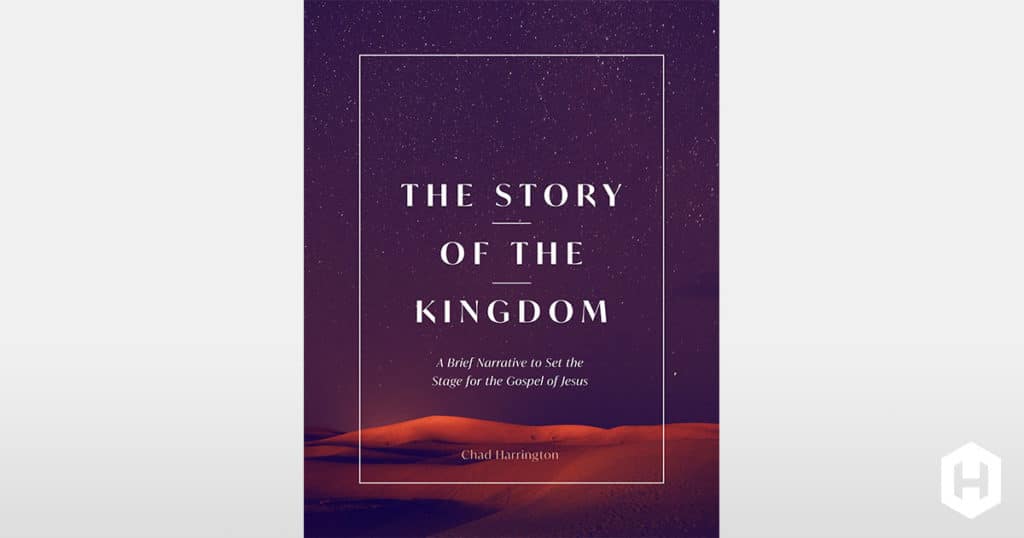The following is an adapted manuscript from a message I delivered to Harpeth Christian Church about the Gospel in Genesis. You can watch it on YouTube here. We’re teaching through the whole book of Genesis, and my message was an intro to the whole book. I wanted to accentuate hints toward, foreshadowings of, and arrows pointing toward the gospel of Jesus in Genesis:
Today we’re going to look at the book of Genesis as a whole. Now, it’s exciting that our church is going to be going through Genesis, because Genesis is such an important book. Objectively, it’s an important book in history.
But why is Genesis an important book for us as Christians?
We might ask ourselves, Don’t we just need the Gospel in the New Testament? Don’t we just need Jesus? Now, we would never say it, but we might think, Isn’t the Old Testament about a different God? The wrathful God of the Old Testament was a different god than the all-loving God of the New Testament.Plus, we think, there’s a lot of debate about creation versus evolution and all of that is hard to understand, what is true after all? Even when we find the truth in this ancient text, does it even matter for our lives today?
Our series in Genesis will walk through all of those questions and more.

My main objective here is to show you this one thing: the gospel in the book of Genesis. Or should I say, the seeds of the gospel in Genesis. For this reason, we need this book, it’s true, and God can use it to change your life here and now.
The Old Testament, sometimes called the Hebrew Scriptures, is like the setup of a joke and the NT is the punch line. The Old Testament is, in narratival terms, the characters and the setting, the inciting incident, and the rising action, and Christ in the New Testament is the climax. You can’t understand the climax of the covenant without understanding the covenant in the first place.
We need the stories of Genesis, in particular, because they tell us the essential beginning of our story without which we would have no context for the middle and end of the story. Without the hole and the hope created in Genesis, we lose the meaning and value of its fulfillment.
The book of Genesis is fifty chapters of incredible narrative. Written by Moses, as we learn from the New Testament, this story provides answers for some of the most important questions we all ask, our answers to which form how we see the world: How did we get here? What went wrong with the world? What will it take to fix it?
My goal here is simple, and exciting. I’m going to take you on a flight through five key passages in Genesis that reveal the gospel of Jesus in Genesis. I’m going to call these signposts, and they come in a few varieties: three as direct messianic prophecies, one as foreshadowing, and one as an anchor. All these signposts speak of and point toward Jesus. I’m going to take you through five of my personal favorite passages. I chose these five because I think they’re the clearest and most direct signs of the gospel, and because I think it will encourage you in your faith.
Let’s start with the signpost that anchors us in identity. I’m calling this “our center.”
Genesis 1:1—Jesus, Our Center
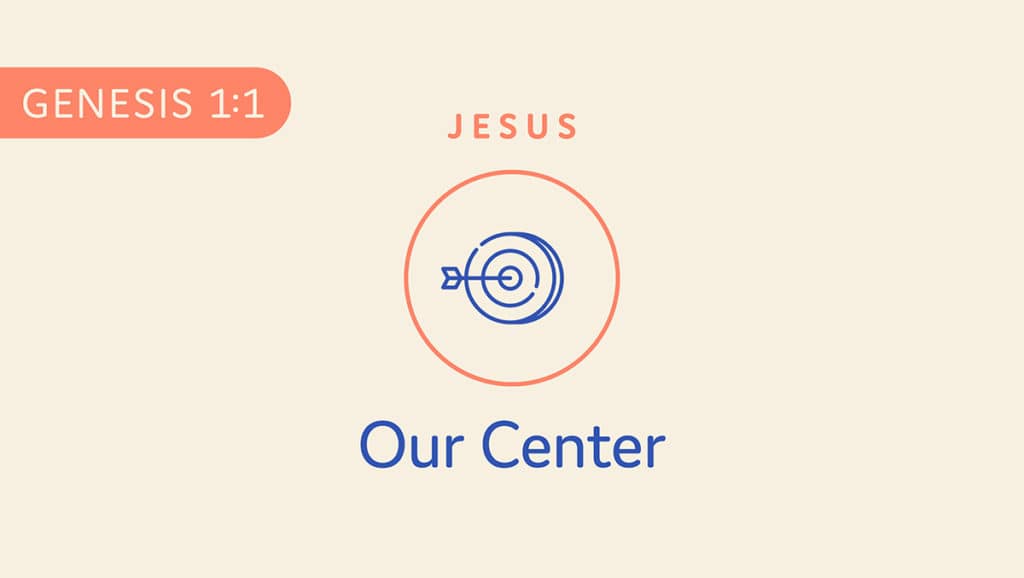
As you would hope, we can see Jesus in the very beginning. In fact, it’s the very first few words: “In the beginning God created the heavens and the earth” (Genesis 1:1, NIV).
The Gospel of John begins the same way: “In the beginning was the Word, and the Word was with God, and the Word was God” (John 1:1).
Jesus was there in the beginning, and in fact, as Colossians 1:16–17, Jesus created the world: “For by him all things were created: things in heaven and on earth, visible and invisible, whether thrones or powers or rulers or authorities; all things were created by him and for him. He is before all things, and in him all things hold together.”
From the very beginning, we see Jesus, the Logos.
The Logos is the organizing principle of the universe around which everything finds its place. It’s the center of the universe.
Why does this matter?
From the beginning, God has always been the center of our identity.
Today, there’s a major search for identity, and we have the ultimate answer. Our ultimate center of our identity is not in our work, it’s not in what position we have in society, and it’s not in our possessions or how much we have. Our source of identity is not found inside of ourselves; it’s found in Jesus Christ, who is from the beginning and who created the world. So we read Genesis to ground ourselves in the center of our identity in God.
The next signpost I’m calling “our victory,” and this is a messianic prophecy about Jesus in Genesis 3:15.
Genesis 3:15—Jesus, Our Victory
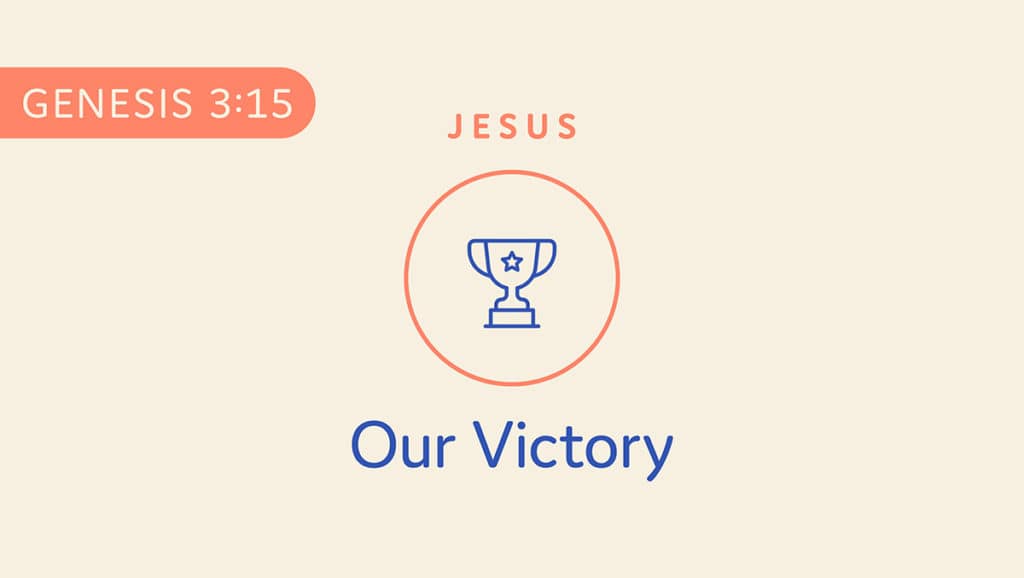
Genesis 3:15 provides for us the first messianic prophecy on record. It says:
“And I will put enmity
between you and the woman,
and between your offspring and hers;
he will crush your head,
and you will strike his heel.”
—Genesis 3:15
This passage is sometimes called the “first gospel” or “the mother prophecy” because it’s the first widely recognized messianic prophecy in the Bible.
It’s an important prophecy, so let me tell you what it means in bullet point format:
- There’s enmity (or hatred) between the woman and the serpent, who is Satan.
- There’s also enmity between each one’s offspring.
- But someone of her offspring will crush his head, even though he will strike (or bruise, some translations have it) his heel.
The striking at his heel is all the attempts to destroy the Messiah. In Jesus’ life Satan worked to:
- Incite Herod to kill Jesus as a baby.
- Tempt Jesus in the desert through dangerous feats.
- Work through Judas, who handed Jesus over to the Romans, who flogged him.
- But in a turn of events, Jesus, our victory, offers a definitive blow to Satan: “Since the children have flesh and blood, he too shared in their humanity so that by his death he might destroy him who holds the power of death—that is, the devil” (Hebrews 2:14).
In Genesis, we learn that God has always had this victory in mind.
Our victory is Jesus the Messiah.
Why does this matter?
Because Jesus’ victory is not just a good story; his victory actually becomes our victory.
Notice what Paul does with this passage from Genesis in Romans 16:19–20. He describes this incredible implication of this messianic victory for the church: “Everyone has heard about your obedience, so I am full of joy over you; but I want you to be wise about what is good, and innocent about what is evil. The God of peace will soon crush Satan under your feet. The grace of our Lord Jesus be with you.”
The victory of Christ over Satan is our victory, too. Here’s what that means: Because Jesus has defeated Satan, he has no hold on us either—because we are in Christ. This means that we don’t have to give into lies, manipulation, confusion, deception, or sin. In Christ, we have freedom from Satan’s powers over our lives that cause us to stray.
Are you living in victory today or in defeat. Let me tell you, Harpeth Christian Church, that in Christ, we have not just victory, but we have the victory which unlocks all other battles. You don’t have to be enslaved by Satan anymore, because he’s been defeated.
Today, church, take hold of your victory in Jesus.
And this victory is ours together. We need each other to fight.
We fight together in discipling relationships, in our small groups and in t-groups and in the hall on Sunday mornings. We fight for each other with each other because, in Christ, together we have the victory.
Our next signpost is another messianic prophecy, and this one I’m calling “our blessing.”
Genesis 12:1–3—Jesus, Our Blessing
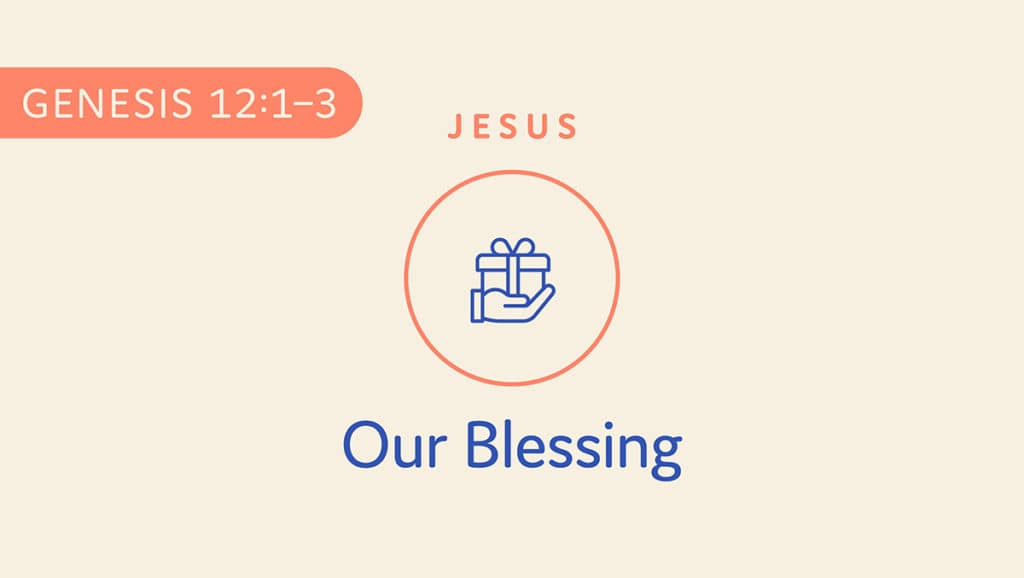
In Genesis 12, we receive another great prophecy about Jesus the Messiah:
God calls Abram, to leave his land and go to a new place. God said, “I will make of you a great nation . . . . and in you all the families of the earth shall be blessed” (Genesis 12:1–3, NRSV).
God would make Abram into Abraham, the father of many, into a great nation, but it goes further: through his lineage, all the families of the earth will be blessed.
Jesus was a descendant of Abraham, who through his gospel has blessed not just every nation but also every family unit. Isn’t that cool?
I wonder if that changes things for you. If you struggle to trust God, take heart in this: that in the beginning God had a plan to bless the whole world—every nation, not just one nation. Jesus said, “Go make disciples of all nations,” and thus ushered in the beginning of fulfilling this prophecy.
The God of the Old Testament is the same as the God of the New Testament.
God has always had a plan for our blessing through the gospel of Jesus.
The next passage today is not an explicit prophecy, but it’s a clear and strong foreshadowing of Jesus, “our sacrifice.”
Genesis 22:8—Jesus, Our Sacrifice
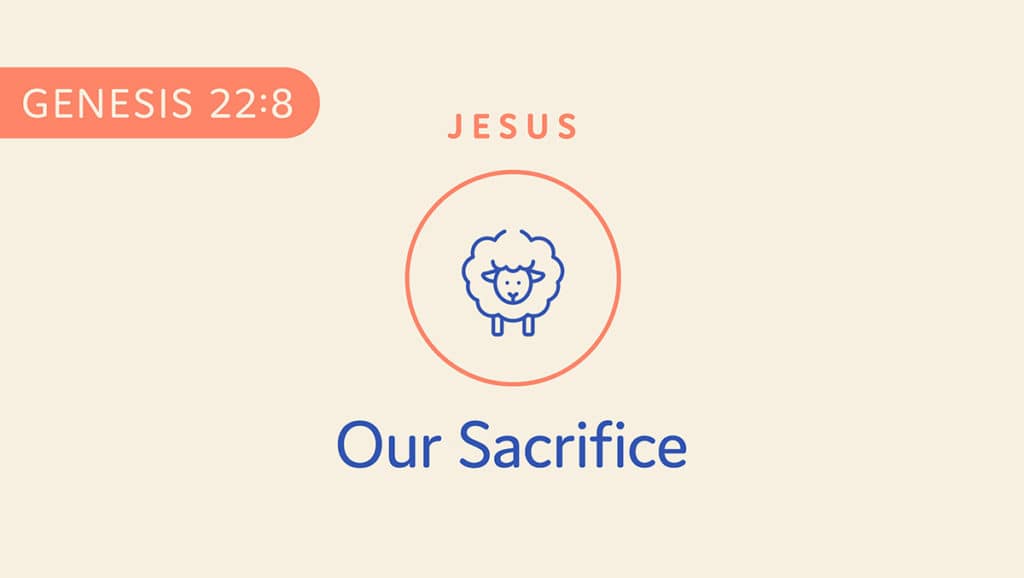
In Genesis 22:8, we see one of the most incredible foreshadowing examples of Jesus in the Old Testament: “God himself will provide the lamb for a burnt offering, my son.”
This quote of Abraham comes in the midst of his almost sacrificing Isaac on Mt. Moriah. Isaac questioned him about the sacrifice, and Abraham trusted God to provide.
We actually have a picture of Isaac’s face in that moment:
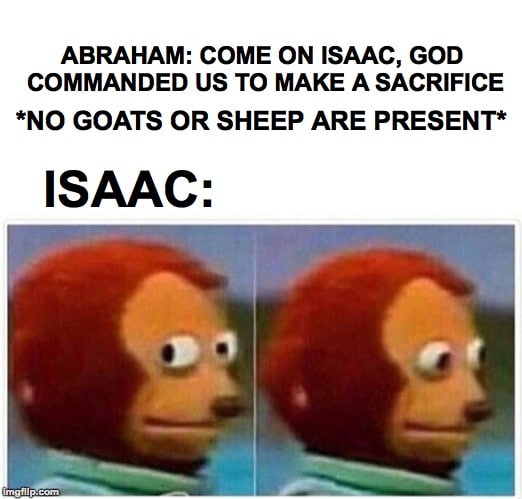
That day, they saw a ram stuck in the thicket by its horns. Rams are male sheep, and Jesus became the ultimate sacrificial lamb outside of Jerusalem.
This is where it gets really cool: Mt. Moriah became the mountain upon which Jerusalem was built (2 Chron. 3:1), so on the very mountain where Abraham said this, Jesus was sacrificed.
God has always planned to be the sacrifice.
God has always had a plan, and Jesus was always the sacrifice.
Why does this matter?
Salvation doesn’t come without a cost. In our world today, everything is free and now and convenient. We’re reminded that there’s always a sacrifice; our work, our sacrifices, and even giving up what we treasure the most doesn’t cut it. What we bring to God, as important as it is, is never enough to save us. It must be God himself, who provides our sufficient sacrifice.
The fifth signpost in Genesis is another direct prophecy about Jesus, “our king.”
Genesis 49:10—Jesus, Our King
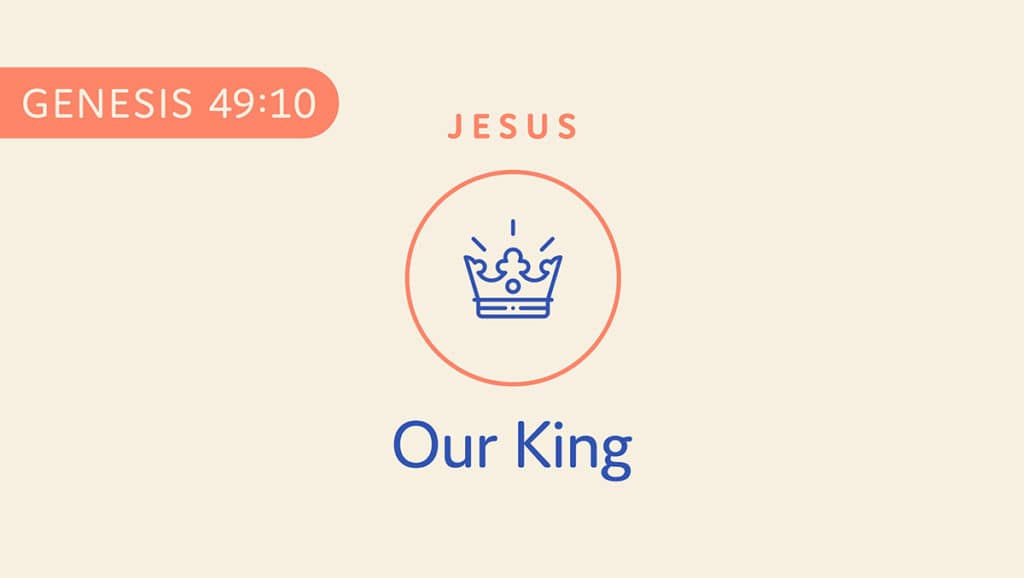
When the patriarch Jacob blesses his sons, he gives Judah a blessing that prophecies the messiah:
“The scepter will not depart from Judah,
nor the ruler’s staff from between his feet,
until he comes to whom it belongs
and the obedience of the nations is his.”
—Genesis 49:10
God chose to place Jesus in the Lion’s tribe because Jesus as Messiah would come through the lineage of Judah, as a son of David, as a powerful king over God’s people.
Catch this: The obedience of the nations belongs to him.
This is exactly what we find in Matthew 28, when Jesus said, “All authority in heaven and on earth has been given to me. Therefore, go and make disciples of all nations … teaching them to obey everything I have commanded you” (Matthew 28:18–20).
Jesus came as the Lion of the tribe of Judah, ready not to destroy but to fight for them. He came with power and authority, and he demands our obedience.
From the beginning, God has planned for Jesus to command the obedience of the nations.
Why does this matter?
Because Jesus didn’t come just to give us a path toward “self-fulfillment” or a way to discover ourselves or become enlightened. He came to establish a kingdom, and we’re invited to join it. We’re invited to not just give our tithe, or our attendance, or even our mere mental ascent to his existence; we’re invited to join his kingdom and give our full obedience. We don’t get privatized religion with Christ; we get something beyond ourselves that we get caught up in. It’s called the kingdom of God, and we find King Jesus at the center of it, even in Genesis.
So Harpeth Christian Church, let’s get excited about this series we’re going through in Genesis because:
We need this text to ground our identity in God—which starts at the beginning
We need this text to root our victory over Satan in Jesus—from the beginning
We need Genesis because it reveals God’s plan for the world—from the beginning
We need Genesis as a reminder that salvation comes from God—a plan from the beginning
We need Genesis because it reminds us that our gospel is the Good News of a kingdom; it’s about Jesus who came to redeem the world, rule with a staff firmly fixed between his feet, and command obedience over the universe.
We need Genesis because Genesis is a story about the gospel of Jesus.
Download “The Story of the Kingdom” here.
You may also be interested in the HIM Publications book by Bill Hull and Ben Sobels The Discipleship Gospel, which you can purchase here.
The God of the Old Testament truly is the God of the New Testament, which is what we’ll continue to see in the coming months.
So church, let me leave you with some specific encouragement:
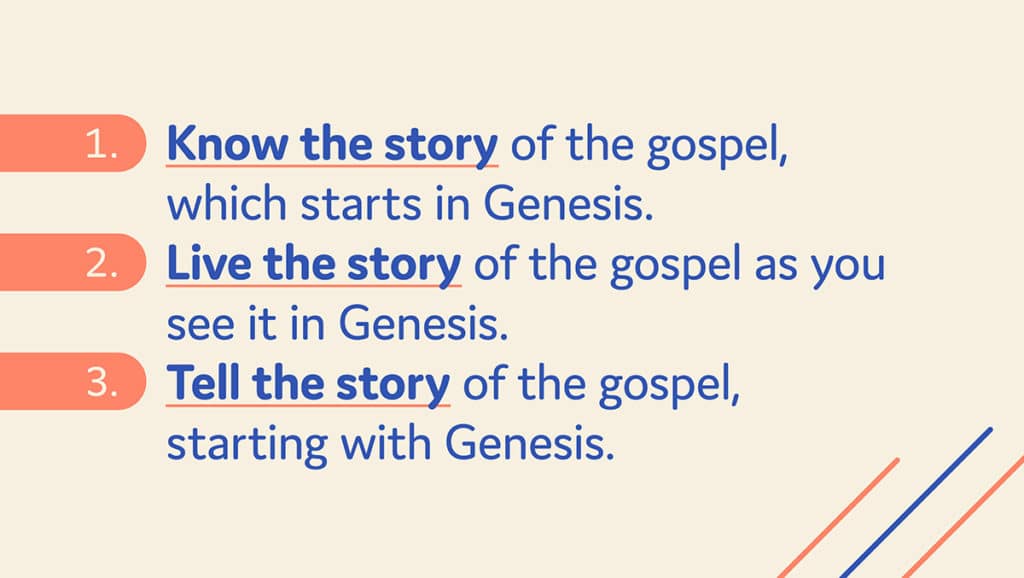
To conclude, let me say that it’s interesting that in Luke 24, when Jesus made sense of his death and resurrection through the Old Testament, he started with “Moses” and interpreted the Scriptures about himself in the Old Testament. I’m confident he started in Genesis, and we should too.
